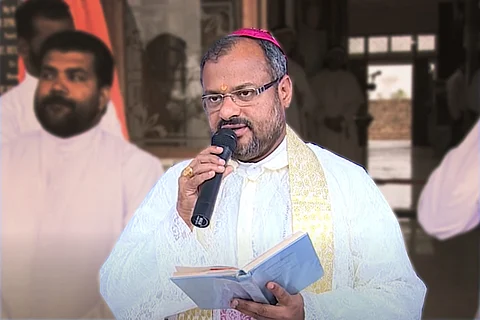

A day after a court in Kerala acquitted Roman Catholic Bishop Franco Mulakkal of the charges of raping a nun in a convent in the state, TNM has learnt that the prosecution has decided to file an appeal against the verdict. The survivor, a nun from the Missionaries of Jesus convent in Kottayam’s Kuravilangad, has been fighting the case against the Jalandhar diocese bishop Franco Mulakkal for nearly three years, accusing him of raping her 13 times between 2014 and 2016.
The court acquitted Franco Mulakkal citing various reasons, including “the victim's inconsistent version of incidents and lack of corroborative evidence to prove the prosecution case.” TNM has learnt that the prosecution has decided to appeal the verdict on several grounds, including the fact that the judge had discredited the survivor’s version of events because of minor differences in her testimonies when she recounted the incidents on different occasions.
Acquitting the bishop, judge of the Kottayam Additional District and Sessions Court-I G Gopakumar, in the order, said that ‘in view of the inconsistent version of the victim, this court is of the view that she cannot be categorised as a sterling witness’, thereby discrediting her. The judgment said that ‘there is no consistency in the statement of the victim’, referring to minor changes in deposition made by her at different times.
The appeal against the acquittal will also be made on the grounds that many of the prosecution's witnesses were discredited for minor reasons. The testimony of one of the witnesses, also a nun, was discredited because after deposing in the case, she had written to her superiors saying her statement was given under police pressure and was not true. The letter, she had later said, was written out of fear that she might face consequences from the congregation for cooperating with the investigation. Noting that her testimony was discredited without taking into consideration the circumstances in which she wrote the said letter, the appeal will contest such unsatisfactory grounds for disputing the prosecutions’ witnesses.
The court had also noted that the survivor had not used a particular word to explain about the assault each time, which has been noted as a sign of inconsistency. The prosecution in its appeal will point out that the survivor was just a layperson with no legal knowledge behind the usage of words, and to expect consistency in language while talking about a traumatic experience is unacceptable.
The appellants are also to highlight the fact that the court has not given due appreciation to the reason behind the delay in reporting. The judgment reads that ‘though the prosecution has attempted to explain the delay ranging from four to two years, there is no satisfactory explanation of the delay’ and goes on to state that the survivor had started voicing out about the incident only after an allegation was made against her and the subsequent commencement of an enquiry into the matter.
While the court had accepted that Franco had authority over the survivor and the existence of a fiduciary relationship between them, the judgment had missed to empathise with the reason behind the delay. As noted by the former Superintendent of Police Harishankar, soon after the judgement, the social background of the complainant and the fiduciary relationship that led to the alleged exploitation has not been given due consideration,
The survivor’s lawyers have also pointed out that the judgment appeared to indicate that the incident was consensual, despite the fact that the accused had not directly or indirectly established that this was the case. The appeal will also note that the judgment did not refer to the prosecution’s arguments while repeatedly drawing on the defence’s statements.